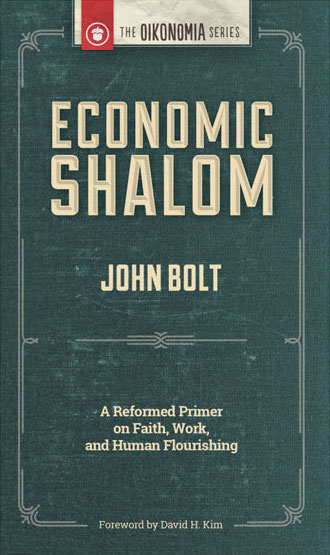
In the days after Black Friday, Cyber Monday, and all the rest, the Christmas shopping season is well underway—and with it, a peculiar blend of hyper-generosity and hyper-consumerism.
Surely there is much to celebrate, and not just in the social and spiritual glories of human exchange and gift-giving. Such activity is also creative and productive in an economic sense, serving to bolster businesses, boost employment, and accelerate economic growth. But amid the opportunities for creative service and extravagant generosity, competing temptations of materialism abound, threatening to twist our Christmas merriment into a pursuit of self-indulgence or self-gratification.
As Christians, how are we to respond? How can we celebrate and participate in the deeper and wider abundance of the Christmas season without succumbing to the stuff?
 “The economic growth that is so integral to our order does, nonetheless, place Christians before a conundrum of sorts,” writes theologian John Bolt in Economic Shalom, Acton’s Reformed primer on faith and economics. “In affirming the liberty that is essential to it, we open the door to the materialist temptation reflected in a consumerist mentality, and we run into the question of sustainability—can we keep up this engine of growth without sating and dulling our souls and running out of planetary resources?”
“The economic growth that is so integral to our order does, nonetheless, place Christians before a conundrum of sorts,” writes theologian John Bolt in Economic Shalom, Acton’s Reformed primer on faith and economics. “In affirming the liberty that is essential to it, we open the door to the materialist temptation reflected in a consumerist mentality, and we run into the question of sustainability—can we keep up this engine of growth without sating and dulling our souls and running out of planetary resources?”
It’s a question that has led to many holiday critiques of capitalism, arguing that markets are a primary source of materialistic excess and moral rot. Yet as Bolt explains, this sort of blame game avoids the more difficult and permanent questions about personal responsibility and ownership that have long predated capitalism, and surely persist in today’s more socialistic and authoritarian economies. “The biblically mentioned sins of Achan (Josh. 7), King Ahab (1 Kings 21), Elisha’s servant Gehazi (2 Kings 5:19–27), Judas (John 12:4–6), and Ananias and Sapphira (Acts 5) all happened long before Adam Smith and the celebration of free-market economies,” Bolt writes.
The processes and pathways of capitalism are largely neutral in nature, facilitating both good and bad behavior. Yet we, as participants, are not, introducing a range of moral tensions amid the range of consumer choices that capitalism produces:
Acquisitiveness is not an institutional flaw but a personal human failing. And, above all else, it is a religious-spiritual-moral failing for which the antidote is the gospel truth that “one’s life does not consist in the abundance of his possessions” (Luke 12:15), along with our Lord’s warnings against the idolatry of mammon (Luke 16:13; cf. 1 Tim. 6:10). The church’s proper response to the sin of consumerism is not to denounce the market but to expose the sins of the human heart and offer the gospel as liberation.
The base sin here is materialism, the belief that our lives will be happier and more fulfilled when we have more stuff. And since even our legitimate desires—food, drink, shelter, and companionship—are insatiable, enough is never enough. Without pleading for including “shopaholism” as a genuine mental disease to be catalogued in the DSM-5 (Diagnostic and Statistical Manual of Mental Disorders), we do note that acquisitiveness is addictive. As with all addictions, we need more and more to get the same satisfaction, a satisfaction that becomes ever more elusive because, as Christians know, idols only destroy. This cycle can continue until a person is reborn by the Spirit of God and experiences the “rest” of soul that can only be found in God. Augustine was not the first to experience such rest, but he expressed it so well: “[Y]ou have made us for yourself, and our heart is restless until it rests in you.”
…The spiritual disease at the heart of materialism is the passion to live only for the present moment, to gratify immediate desires, to acquire more and more without any thought for tomorrow.
But if we needn’t criticize or dismantle our economic system, what must we do? Do we abstain from shopping altogether? Do we hide ourselves from the cultural forces at play and keep our Christmases gift-less?
Such an option still seems to be stuck at the surface, guilty of its own obsession with the power of material things. As Bolt continues, the primary issues have to do with the “spiritual and moral foundations of the culture.” A fatalistic withdrawal avoids the greater and more mysterious ownership responsibility that we’ve been called toward:
…As Pope John Paul II observed in his encyclical Centesimus Annus(“On the Hundredth Year”), the problem of consumerism cannot be resolved from within the market itself (CA, § 36, condensed version repr. in Richard John Neuhaus, Doing Well and Doing Good, 297). Nor, we must add, can the passing of laws by the state cure it; as a spiritual-moral problem this has to be addressed from within the moral-cultural sphere by churches rather than legislatures. In the words of John Paul II, “To overcome today’s individualistic mentality we require a concrete commitment to solidarity and charity, beginning with the family” (CA, § 49; repr. in Neuhaus, Doing Well and Doing Good, 301).
Resistance to the market’s pull toward acquisitive consumerism requires spiritual resources; providing them is what the church is singularly called and equipped to do as she bears witness to the gospel. Instead of simply denouncing the market as many contemporary church pronouncements do, we need to concentrate on cultivating and nurturing the spiritual disciplines that equip us to resist the siren songs of advertisers to buy and spend, spend and buy.
When seen in this way, capitalism—and particularly, Christmastime capitalism—actually provides us with tremendous opportunities to wield our stewardship wisely and pursue a path of extravagant generosity devoid of self-indulgence. To cultivate that wisdom as a cultural norm will require intense discipleship, but the fruits will be sweet as we grow and learn to engage with risk and wisdom rather than withdraw in fear of greed or scarcity.
“Economic growth and increasing prosperity are not identical with consumerism,” Bolt concludes, “though it is a demanding challenge—recall our Lord’s observation about camels and needles—one can be both wealthy and a faithful steward of God’s gifts.”
Though some may believe that the temptation toward materialism will inevitably be the stronger force, regardless of those efforts, we can remember the words that Jesus gave to his disciples after the rich young ruler walked away, forlorn amid the seeming chains of wealth. “With God, all things are possible.”
Image: Public Domain

